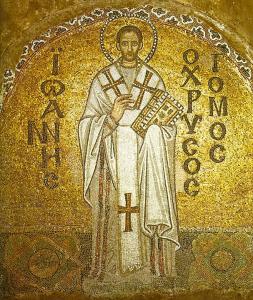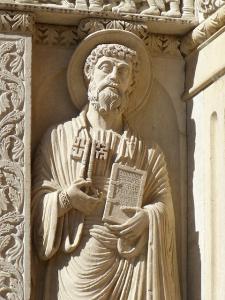Who Is Fr. Altman?
Fr. James Altman of Wisconsin has achieved notoriety over the past year and some, for a number of reasons. He has asserted that it is impossible to be a Catholic and a Democrat, citing abortion as the reason, while ignoring all criticism of the GOP. He has called the coronavirus pandemic a hoax, accused bishops of deserting their flocks by closing churches to prevent its spread, and stated that they will “burn in hell” for following these safety guidelines. He claimed in a homily that his “research” on lynchings showed they were caused by “homicides and rapes” and referred to them as “capital punishment carried out by a mob”. And this is just a small selection of his rhetoric.

He is apparently unable to see why his bishop considers him divisive. Bishop Callahan of La Crosse has asked him to step down from leading the parish of St. James the Less. Bishop Strickland of Tyler, flouting the usual norms among bishops, has said that Fr. Altman is “in trouble for speaking the truth.” Fr. Altman himself, in his homily yesterday, compared this request for his resignation to martyrdom, and has begun fundraising to appeal his bishop’s decision.
The Snake’s Fang
I’m not going to go through all of this priest’s outrageous and vile errors. I don’t have the time or the stomach for that. Nor do I have a great deal of hope of convincing the sort of person who would listen to him for an instant once they’d heard this stuff. I would, however, like to focus on one very serious error he made in his Pentecost homily—one that I believe lies at the root of traditionalist rebellion against the Church just as much as modernist rebellion against the Church.
Many have jumped on the injection bandwagon, daring to call it our moral duty to take the experimental injection. Dear family, their statement, from the Bishop of Rome on down, is not infallible. No, as we learned in seminary, in the last two thousand years, depending on who’s doing the counting, infallible statements have been made maybe four to seven times—that’s it. Anything else? An opinion.
I can’t say for certain what they’re teaching in La Crosse’s seminary, of course; but either they are grossly mis-educating their priests, or Fr. Altman is a fool or a liar.
Liar is the single worst insult in my vocabulary. I would prefer to believe that he was either grossly mis-taught or is just badly confused. Thankfully, I don’t need to judge his soul. But intentionally or not, he is in fact deceiving tens of thousands of Catholics across the country on this point. So I’d like to speak to that.
The Syllabus of Errors

The Syllabus of Errors was a document written under the ægis of Pope Pius IX. He composed it as an antidote to modernism, a family of heresies that came to prominence in the nineteenth century. It condemned several propositions relating to pantheism, indifferentism, communism, liberalism, and other currents of thought. The Syllabus tends to be a favorite document with traditionalists, not least because of its opposition to socialism and religious liberty. One of the statements it condemns is the following:
The obligation by which Catholic teachers and authors are strictly bound is confined to those things only which are proposed to universal belief as dogmas of faith by the infallible judgment of the Church.
Pope Pius IX declared this an error. In other words, Catholic teachers and authors—such as priests—are not free to dismiss the Church’s judgment as “an opinion” merely because that judgment doesn’t rise to the level of dogma.
So Wait, What’s Infallibility?
This is a tricky question, or at least, I find it difficult. I accordingly invite correction from people who know what they’re talking about better than I do.

The Church is the mother and teacher of the faithful. Her teaching is divine revelation, which the Holy Ghost safeguards in her. The bishops, and assistants they appoint (like priests and catechism teachers), are the Church’s normal voice for this teaching; the name for this is the ordinary Magisterium. As you might expect, most Christian instruction takes place through this ordinary Magisterium.
However, in exceptional circumstances (like if a dispute arises), the Church may exercise her extraordinary Magisterium. This refers to the Catholic Church as a whole, speaking as one. That usually means an ecumenical council, but can also refer to the Pope making a solemn definition without convoking a council.
Here’s the thing, though: both the extraordinary and the ordinary Magisterium are infallible. What differs is the means they use, not how authoritative they are. And priests are specially bound to accept the Church’s teaching, whether extraordinarily or ordinarily promulgated.1
Wait—It’s All Infallible? That Doesn’t Sound Right.
No, not everything every clergyman says in infallible. Your CCD teacher, or whoever, did (I hope) correctly tell you that the Pope can’t infallibly declare sunshine to be rain or anything like that; her authority extends to faith and morals, not “all true things.”
Moreover, the Church sets forth ideas with varying degrees of gravity, and with different purposes in mind. An exhortation is not primarily meant to teach, but to urge action upon the faithful, even though that urging may naturally discuss certain truths. At the other extreme, a definition, like Ineffabilis Deus, explicitly and solely aims to define something as a divinely revealed truth that Catholics must, as a moral duty, believe. A definition might imply or justify certain actions—celebrating the Immaculate Conception in the liturgy, for instance—but only as a corollary.

The context this stuff normally comes in, whether the ordinary or extraordinary Magisterium is involved, are formal Church documents: encyclicals, pastoral letters, that kind of thing. The point of the doctrine of infallibility is, roughly, that “When the Church tries to teach, she succeeds,” and then to outline in more detail what “the Church trying to teach” looks like. There’s a difference between the Pope’s personal opinions (even on theological subjects) and formal dogmatic pronouncements, yes; if the Pope isn’t trying to teach, he isn’t teaching. But this difference is very much not “If it’s not a formal dogma, it’s just a human opinion.” It is a radical, disastrous distortion of Catholic belief to think or say that.
Degrees of Clarity
Ineffabilis Deus gives us a good example of something else, too: the distinction between dogma and truth. To take an example, the Blessed Virgin Mary went into heaven bodily. That was true for about nineteen centuries before the Pope defined it; it was part of the deposit of faith before the Pope defined it.
However, before the definition, it may not have been equally clear to everybody that it was part of the deposit of faith, as distinct from being a reasonable and pious but non-binding opinion. By contrast, the idea that unbaptized babies who died went to Limbo was only ever a reasonable opinion, never a dogma, though some under-informed people thought it was a dogma (and some under-informed people today think it used to be a dogma). The reason definitions are useful, even though they aren’t changing the deposit of faith, is that they help us recognize the deposit of faith. The sun shines just as brightly at dawn, or at midnight, as it does at noon; what’s different is our ability to see it. Likewise, what’s at stake here is our power to recognize the truth, not whether it’s true.
Explanation—Implication—Deduction

There are also different degrees of explicitness in revelation. Theologians identify three: formal and explicit revelation, formal but implicit revelation, and virtual2 revelation. The deity of the Father and of Jesus Christ is a formal and explicit revelation—both are referred to in Scripture as God without qualification. The deity of the Holy Ghost is a formal but implicit revelation: equally true, equally divinely revealed, but more obscure; context-sensitive interpretation brings this out. The full doctrine of the Trinity, which harmonizes these truths with the formal and explicit revelation that “the Lord is one,” is thus a virtual revelation, something we deduce as necessarily true from other known truths.
These three degrees of explicitness, again, imply different levels of responsibility. If a doctrine is implicit or virtual, it takes a level of time and attentive intelligence to grasp, and not every person has those things, or has had a chance to apply them. A person might be quite innocently ignorant of a virtual revelation, even though they fully assent to formal revelation.
So?
So here’s the skinny. Different aspects of the truth have different levels of importance and clarity. This, in turn, means that we have varying levels of responsibility for them. A truth that’s simple and obvious should be easy to assent to, while one that’s complex and mysterious may pose us genuine, non-blameworthy problems. Our responsibility to grasp and believe the truth also varies according to our own capacities and station in life. Theology teachers have a more serious obligation than line cooks or dog breeders to know, accept, and be able to explain Catholic dogma. It’s their job.
And it is very much a priest’s job too. By his ordination, Fr. Altman accepted the duty to understand, embrace, and pass on the Church’s teaching. Whatever the reason, he’s failing to do that on this point.
I want to stress one more time that I cannot and have no right to pass spiritual judgment on Fr. Altman. (This reminder is much more for me than my readers.) The point I’m making here is that he’s distorting the Church’s teaching about Church teaching. That is a terrible error for any priest to make, both for him and because it warps the faithful in his wake.

Don’t stick to your favorite priest, no matter who he is. Ubi Petrus, ibi Christus. Stick to Peter. Peter is the rock. It’s what he’s there for.
Footnotes
1Not in the sense that it is “more true” for them or anything like that. Rather, since they’re responsible to serve the faithful, they have a special duty to their neighbor as well as to God when it comes to the Magisterium.
2This word is a little unfortunate in modern English. We usually contrast “virtual” with “actual,” as in the phrase “virtual reality.” In its Latin origin, however, it means something more like “effective” or “in substance.” So, e.g., keeping someone locked in a room and refusing them water for a week is “virtually” killing them in the relevant sense, not because it makes them feel terrible, but because it in fact is killing them even though you haven’t shot them or something.
















